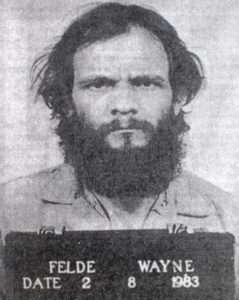Wayne Felde was executed by the State of Louisiana for the murder of a police officer
According to court documents Wayne Felde, who was a Vietnam Veteran, would attempt to escape when he was being brought to jail on a case of drunkenness would shoot and kill Officer Thomas Tompkins
Wayne Felde would be convicted and sentenced to death
Wayne Felde was executed by way of the electric chair on March 15 1988
Wayne Felde Photos

Wayne Felde FAQ
When was Wayne Felde executed
Wayne Felde was executed on March 15 1988
How was Wayne Felde executed
Wayne Felde was executed by way of the electric chair
Wayne Felde Case
Wayne Robert Felde, who had pleaded with a jury to impose the death penalty to keep him from killing again, was executed in the electric chair early Tuesday for the 1978 slaying of a rookie policeman.
Felde, 38, went to his death at 12:14 a.m. after the U.S. Supreme Court late Monday refused in a 7-2 vote to stay the execution.
″You can kill the messenger but you can’t kill the message,″ he said in his final statement. ″Sooner or later, you have to acknowledge it for what it means, not for what you want it to mean.″
He gave no indication what he referred to, but paused so that witnesses could write it down.
Felde was convicted of shooting a policeman in the back in Shreveport while being taken to jail in handcuffs for drunkenness. An Army veteran of Vietnam, Felde had claimed at trial that his wartime experience had made him insane.
The execution occurred less than a day after Gov. Buddy Roemer was inaugurated. Felde’s lawyers had planned to ask the governor to stop the execution until a new pardon board could consider the case.
Roemer had said earlier he would not intervene.
In Starke, Fla., meanwhile, Willie Jasper Darden, who survived an unprecedented six death warrants and became an international cause celebre, awaited execution in the electric chair early Tuesday for the 1973 slaying of a businessman during a robbery.
The last time there was more than one execution in one day in this country was Aug. 28, when murderers were put to death in Alabama, Florida and Utah.
Felde was the first person in Louisiana to use his Vietnam service as the basis for a criminal insanity plea.
He said finding Viet Cong tunnels and being exposed to the chemical Agent Orange left him subject to flashbacks and unable to tell right from wrong when he pulled a gun hidden in his pants and shot Officer Glen Thomkins while being taken to jail in handcuffs.
In 1980, a jury convicted him of first-degree murder, which carries life in prison or death in the electric chair. Felde asked for the death penalty, ″or other deaths will result.″
″It’s happened twice in eight years. There’s been 10 years of proof shown to you,″ he told the jury. Felde at the time of the slaying was a fugitive from a work release program in Maryland, where he had been convicted of manslaughter.
Felde withdrew his request after the trial, and his appeal to the Supreme Court was based in part on his claim that he was denied competent representation because his attorney at trial joined him in asking for the death sentence.
Felde appeared unsuccessfully before the pardon board appointed by Roemer’s predecessor, Gov. Edwin Edwards, two weeks ago.
Bill Quigley, one of Felde’s lawyers, argued that the old board was tainted by a pardon-selling scandal that sent the board chairman to jail. He said Roemer should refer the case to the new board he appoints.
Ninety-four people have been executed in the United States, including 15 in Louisiana, since the death penalty was revived following a U.S. Supreme Court decision in the 1970s.
The most recent occurred Jan. 7 when Robert Streetman was executed by injection in Texas for murdering a woman in 1982. The most recent execution in Louisiana was Aug. 24.









